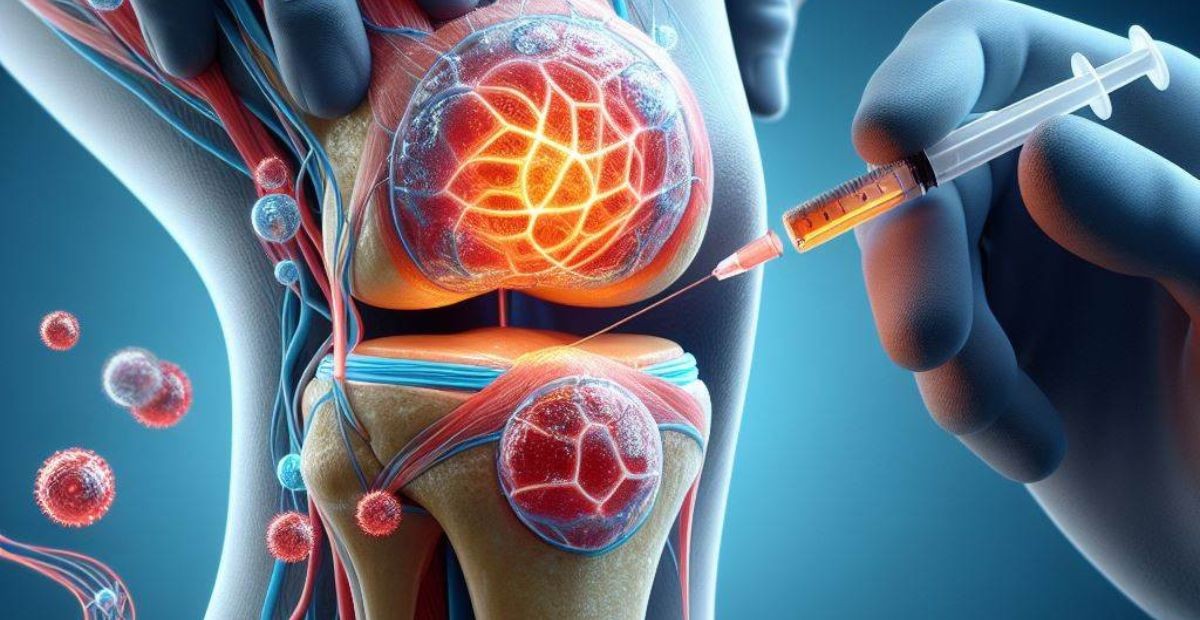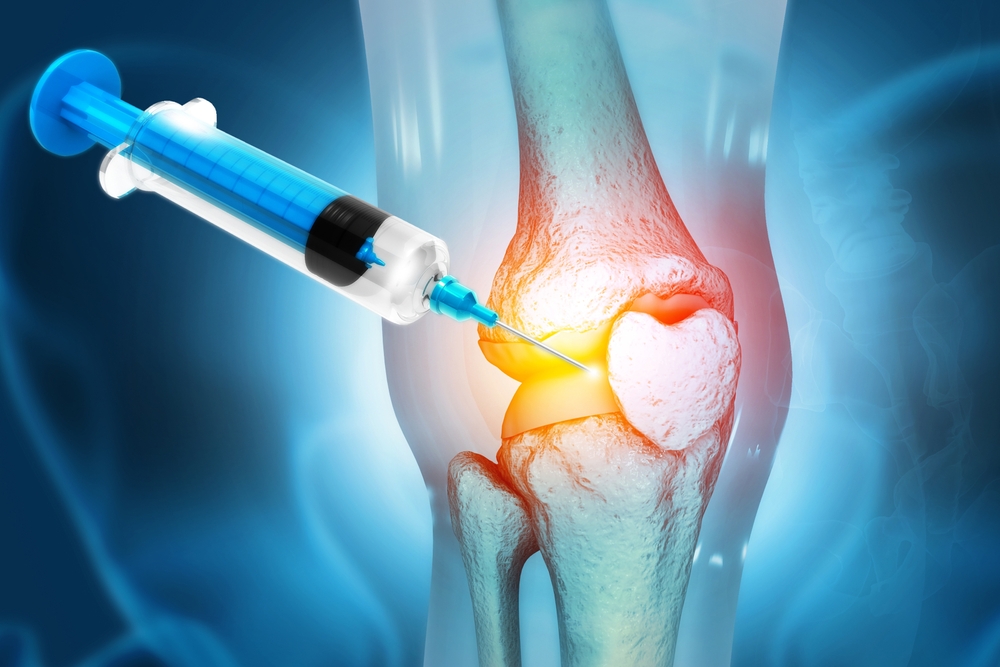Overview
Stem cells for knees offer a promising new hope for osteoarthritis sufferers in constant pain and struggling with mobility. By potentially repairing damaged cartilage and reducing inflammation, stem cell therapy provides relief for those affected by this condition. This article explores the benefits, procedures, and effectiveness of stem cell therapy for knee osteoarthritis, highlighting its potential to improve pain and mobility. It also discusses the collection methods, risks, costs, and alternative treatments, providing a comprehensive guide for those considering this innovative approach to knee health.

Introduction
Stem cell therapy is an exciting development in regenerative medicine, particularly for those suffering from osteoarthritis. By harnessing the power of stem cells for knees, this treatment aims to repair damaged tissue and reduce inflammation, providing much-needed relief.
What Happens in Osteoarthritis?
Osteoarthritis, a degenerative joint disease, occurs when cartilage, the cushioning material at the ends of bones in the joints, breaks down. This leads to pain, swelling, and difficulty in movement. Over time, the condition worsens, making it harder for sufferers to perform everyday tasks.
Regenerative Medicine for the Knee
Regenerative medicine, including the use of stem cells for knees, focuses on repairing or replacing damaged tissues and organs. This innovative field holds great promise for treating osteoarthritis by promoting natural healing processes.
What is Stem Cell Treatment?
Stem cell treatment involves injecting stem cells directly into the affected knee joint. These cells have the unique ability to develop into different types of cells, potentially repairing damaged cartilage and reducing inflammation.
Why Do Experts Believe Stem Cells Ease Osteoarthritis?
Experts believe stem cells ease osteoarthritis by regenerating damaged cartilage, reducing inflammation, and promoting the healing of joint tissues. Their ability to differentiate into various cell types makes them ideal for repairing the complex structures within the knee joint.
Stem Cell Injections for Knees
Stem cell injections for knees involve harvesting stem cells from the patient’s body or a donor source and injecting them into the knee joint. Doctors typically perform this minimally invasive procedure on an outpatient basis, and it does not require a lengthy recovery period.

Does It Work?
Research and clinical trials have shown promising results for stem cell therapy in treating knee osteoarthritis. Many patients report significant improvements in pain, mobility, and overall joint function. However, researchers need to conduct more studies to fully understand the long-term effects and efficacy of stem cell treatment.
What Would Happen After a Stem Cell Treatment?
After a stem cell treatment, patients may experience some soreness or swelling at the injection site. Most can return to their normal activities within a few days. Follow-up appointments are crucial to monitor progress and ensure the best possible outcomes.
Side Effects and Risks
Although stem cell therapy is generally safe, it can have potential side effects and risks. These can include infection, bleeding, and an allergic reaction to the injected material. It is essential to discuss these risks with a healthcare provider before undergoing treatment.
Cost
The cost of stem cell therapy for knees can vary widely, depending on the type of stem cells used and the clinic performing the procedure. Insurance often does not cover it, making it a significant out-of-pocket expense for many patients.
Other Options
Besides stem cell therapy, other treatments for knee osteoarthritis include physical therapy, medications, lifestyle changes, and surgical interventions. It is important to explore all available options and consult with a healthcare professional to determine the best treatment plan.
Umbilical Cord Derived Stem Cells for the Treatment of Knee Osteoarthritis: A Systematic Review
A systematic review of umbilical cord-derived stem cells highlights their potential in treating knee osteoarthritis. These stem cells may offer unique advantages due to their high proliferation rate and low risk of immune rejection.
Link to Study: Umbilical Cord–Derived Stem Cells for the Treatment of Knee Osteoarthritis: A Systematic Review
The Healing Effect of Bone Marrow-Derived Stem Cells in Knee Osteoarthritis: A Case Report
A case report on bone marrow-derived stem cells demonstrated their healing effect in knee osteoarthritis patients. This report showed significant improvement in pain and joint function, providing further evidence of the potential benefits of this treatment.
Link to Study: The Healing Effect of Bone Marrow-Derived Stem Cells in Knee Osteoarthritis: A Case Report
Frequently Ask Questions:
Does Stem Cell Therapy Really Work For Knees?
Stem cell therapy for knees shows promising results for many patients with knee osteoarthritis. Research and clinical trials have indicated that stem cell treatments can reduce pain, improve mobility, and promote the regeneration of damaged cartilage. However, the effectiveness can vary based on the severity of the condition, the type of stem cells used, and individual patient factors. While many patients report significant improvements, researchers need to conduct more long-term studies to fully understand the efficacy and potential benefits of stem cell therapy for knee osteoarthritis. It is important to consult with a healthcare provider to determine if this treatment is suitable for your specific condition.
How Much Does a Stem Cell Cost For Knees?
The cost of stem cell therapy for knees can vary significantly, typically ranging from $3,000 to $8,000 per treatment. This variation depends on several factors, including the type of stem cells used (e.g., bone marrow-derived, fat-derived, or umbilical cord-derived), the clinic performing the procedure, and the geographic location. Because experts often consider stem cell therapy experimental, insurance usually does not cover it, meaning patients need to cover the costs out-of-pocket. It is important to discuss all financial aspects with the treatment provider before proceeding.
Can Stem Cells Regrow Knee Cartilage?
Stem cell therapy holds potential for regrowing knee cartilage by promoting the repair and regeneration of damaged tissues. Stem cells have the unique ability to differentiate into various cell types, including cartilage cells. When injected into the knee joint, they may help to rebuild the cartilage that cushions and protects the bones. Clinical studies and patient reports have shown promising results, with many experiencing reduced pain and improved joint function. However, the extent of cartilage regeneration can vary, and more research is needed to fully understand the long-term effectiveness of stem cell therapy for this purpose. Consulting with a healthcare professional is essential to determine if this treatment is suitable for your condition.
What is the Age Limit For Stem Cell Therapy in the Knee?
There is no strict age limit for stem cell therapy in the knee, as eligibility primarily depends on the individual’s overall health, the severity of the knee condition, and the specific protocol of the treating clinic. While younger patients might have a more robust regenerative capacity, older patients can also benefit from stem cell therapy. Healthcare providers will evaluate factors such as medical history, current health status, and the extent of knee damage to determine if a patient is a suitable candidate for the procedure. It’s crucial to consult with a specialist to discuss the potential benefits and risks based on your specific situation.
Where Can I Get Stem Cell Treatment For Knee?
Stem cell treatment for knees is available at specialized clinics and medical centers that focus on regenerative medicine. To find a reputable provider, consider the following options:
- Orthopedic Clinics: Many orthopedic surgeons and clinics offer stem cell therapy for knee osteoarthritis. These specialists have training in musculoskeletal conditions and can provide expert care.
- Regenerative Medicine Centers: Clinics that specialize in regenerative medicine often offer a variety of stem cell treatments, including those for knee conditions.
- University Hospitals and Research Institutions: Some university hospitals and research institutions conduct clinical trials and offer cutting-edge treatments, including stem cell therapy for knees.
- Referral from Your Primary Care Physician: Your primary care doctor can refer you to a specialist or clinic that offers stem cell therapy.
When selecting a provider, it’s important to ensure they have experience with stem cell treatments and a good track record of patient outcomes. Additionally, verify that the clinic follows regulatory standards and employs qualified medical professionals. Consulting with a healthcare provider can help you find the most appropriate and reputable treatment center for your needs.
Pros and Cons of Stem Cell Therapy for Knees
Stem cell therapy for knees offers several potential benefits but also comes with some drawbacks. Here are the main pros and cons:
Pros of Stem Cell Therapy for Knees
- Minimally Invasive: Stem cell injections are less invasive than surgical options like knee replacement, leading to shorter recovery times and less discomfort.
- Potential for Regeneration: Stem cells have the ability to regenerate damaged cartilage, potentially improving joint function and reducing pain.
- Reduction in Pain and Inflammation: Many patients report significant reductions in pain and inflammation, improving their quality of life.
- Personalized Treatment: Stem cell therapy can be tailored to the individual’s specific condition and needs, potentially offering more effective results.
- Fewer Side Effects: Compared to surgeries and some medications, stem cell therapy typically has fewer and less severe side effects.
Cons of Stem Cell Therapy for Knees
- Cost: Stem cell therapy can be expensive, often ranging from $3,000 to $8,000 per treatment, and is usually not covered by insurance.
- Variable Results: The effectiveness of stem cell therapy can vary based on factors such as the patient’s age, severity of the condition, and type of stem cells used. Some patients may not experience significant improvements.
- Limited Long-Term Data: While short-term results are promising, long-term studies are still needed to fully understand the efficacy and safety of stem cell therapy for knee osteoarthritis.
- Potential Risks: As with any medical procedure, there are risks involved, including infection, bleeding, and allergic reactions. It’s crucial to undergo treatment at a reputable clinic to minimize these risks.
- Regulatory and Ethical Concerns: The field of stem cell therapy is still evolving, and not all treatments are fully regulated. This can lead to variations in treatment quality and ethical considerations regarding the source of stem cells.
Stem cell therapy for knees offers promising benefits, particularly in reducing pain and promoting tissue regeneration. However, it is important to weigh these benefits against the potential costs, risks, and variable outcomes. Consulting with a qualified healthcare provider can help determine if this treatment is appropriate for your specific situation.
What is the Success Rate of Stem Cell Therapy For Knees?
The success rate of stem cell therapy for knees varies based on several factors, including the patient’s condition, the type of stem cells used, and the clinic’s expertise. While precise success rates can differ, studies and clinical reports generally show promising results:
- Pain Reduction: Many patients experience significant pain reduction after stem cell therapy. Studies have reported that 60-80% of patients see improvements in pain levels.
- Improved Mobility: A substantial number of patients report enhanced mobility and joint function post-treatment. Improvement rates often range from 50-70%, depending on the study.
- Cartilage Regeneration: Some studies have shown evidence of cartilage regeneration, although the extent of regeneration can vary. Success rates for noticeable cartilage repair are typically lower, around 30-50%.
- Patient Satisfaction: Patient satisfaction rates are generally high, with many patients feeling the treatment was beneficial and would recommend it to others.
It is important to note that while these success rates are encouraging, stem cell therapy is still considered experimental for knee osteoarthritis. Long-term effectiveness and consistent outcomes across broader populations require further research. Consulting with a healthcare provider can provide more personalized insights into the potential success of stem cell therapy for your specific condition.
Stem Cell Therapy For Knees Side Effects
Stem cell therapy for knees is generally considered safe, but like any medical procedure, it carries potential risks and side effects. Here are some common side effects associated with stem cell therapy for knees:
- Pain or Discomfort: Some patients may experience temporary pain or discomfort at the injection site. This is usually mild and resolves within a few days.
- Swelling: Swelling around the injection site is common and typically subsides on its own within a few days to a week.
- Infection: Although rare, there is a risk of infection at the injection site. It’s essential to follow post-procedure care instructions carefully to minimize this risk.
- Bleeding: Minor bleeding or bruising at the injection site may occur but usually resolves quickly.
- Allergic Reaction: In some cases, patients may have an allergic reaction to the injected material. This is uncommon but can include symptoms such as rash, itching, or difficulty breathing. It’s essential to seek medical attention immediately if any signs of an allergic reaction occur.
- Transient Fever: Some patients may experience a low-grade fever shortly after the procedure. This is usually temporary and resolves without intervention.
- Risk of Tumor Formation: There is a theoretical risk of tumor formation associated with stem cell therapy, although evidence supporting this risk is limited. Long-term studies are needed to fully understand this potential complication.
It’s crucial to discuss the potential risks and benefits of stem cell therapy with a qualified healthcare provider before undergoing treatment. Additionally, choosing a reputable clinic with experienced medical professionals can help minimize the risk of side effects and ensure a safe and effective procedure.
Stem Cell Therapy For Knees FDA Approved?
Last update from January 2022, stem cell therapy for knees has not received approval from the U.S. Food and Drug Administration (FDA) for the treatment of knee osteoarthritis. While the FDA has approved certain stem cell products and treatments for specific medical conditions, the use of stem cells for knee osteoarthritis is still considered investigational or experimental.
However, there are FDA-regulated clinical trials and studies investigating the safety and efficacy of stem cell therapy for knee osteoarthritis. These trials aim to gather data on the potential benefits and risks of the treatment to inform future regulatory decisions.
It’s essential for patients considering stem cell therapy for knee osteoarthritis to discuss the treatment with a qualified healthcare provider, understand the current regulatory status, and carefully weigh the potential benefits and risks before making a decision.
Stem Cell Treatment For Knees Near Me
To find stem cell treatment for knees near you, consider the following steps:
- Consult with Your Healthcare Provider: Start by discussing your interest in stem cell therapy with your primary care physician or orthopedic specialist. They may be able to provide recommendations or referrals to reputable clinics or specialists in your area.
- Online Research: Use online resources to search for clinics or medical centers that offer stem cell therapy for knees in your geographic area. You can use search engines like Google or specialized medical directories to find relevant providers.
- Read Reviews and Testimonials: Once you’ve identified potential clinics or providers, take the time to read reviews and testimonials from previous patients. This can provide insight into the quality of care and patient experiences at each clinic.
- Contact Clinics Directly: Reach out to the clinics or providers you’re interested in to inquire about their services, treatment options, and any specific questions you may have. Ask about their experience with stem cell therapy for knees and what to expect during the treatment process.
- Verify Credentials and Accreditation: Ensure that any clinic or provider you consider is properly licensed and accredited. Look for certifications or affiliations with reputable organizations in the field of regenerative medicine.
- Consider Consultations: If possible, schedule consultations with multiple clinics or providers to discuss your condition, treatment options, and any concerns you may have. This can help you make an informed decision about the best course of action for your knee health.
By following these steps and conducting thorough research, you can find stem cell treatment options for knees near you and make an informed decision about your care.
Who Is a Candidate For Stem Cell Knee?
Candidates for stem cell therapy for the knee typically include individuals with knee osteoarthritis or other knee-related conditions who have not experienced adequate relief from conservative treatments such as medication, physical therapy, or corticosteroid injections. Ideal candidates generally meet the following criteria:
- Mild to Moderate Osteoarthritis: Candidates typically have mild to moderate knee osteoarthritis, although stem cell therapy may also be considered for severe cases in certain situations.
- Good Overall Health: Candidates should be in overall good health, with no significant medical conditions that could interfere with the healing process or increase the risk of complications.
- Failed Conservative Treatments: Candidates have tried and failed to find adequate relief from conservative treatments such as pain medication, physical therapy, or corticosteroid injections.
- Willingness to Participate in Treatment: Candidates should be willing to undergo the stem cell therapy procedure and follow post-procedure care instructions.
- Realistic Expectations: Candidates should have realistic expectations about the potential benefits and limitations of stem cell therapy for the knee.
- Medical Evaluation: Candidates typically undergo a thorough medical evaluation to assess their suitability for stem cell therapy, including imaging tests such as X-rays or MRI scans to evaluate the extent of knee damage.
It’s essential to consult with a qualified healthcare provider to determine if you are a suitable candidate for stem cell therapy for the knee. A healthcare professional can assess your individual condition, medical history, and treatment goals to help you make an informed decision about your care.

Key Takeaway
Stem cells for knees represent a promising new hope for osteoarthritis sufferers. By harnessing the regenerative power of stem cells, this innovative treatment aims to repair damaged cartilage and reduce inflammation, potentially transforming the lives of those affected by this debilitating condition. As research continues to advance, stem cell therapy may become a widely accepted and effective option for knee osteoarthritis treatment.
Additional Resources
Introducing Joint Health 101, a comprehensive digital product designed to support your knee health journey. Explore expert advice, exercises, and tips to complement your understanding of stem cell therapy and enhance your overall joint wellness.



